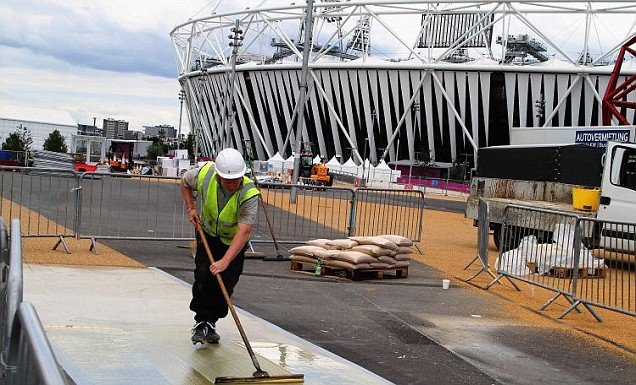Thousands of Olympic athletes and officials are to begin arriving in London, as questions remain about recruitment of security staff.
Preparations for London 2012 are intensifying with the opening ceremony just 11 days away.
The first priority “Games Lane” has begun operation on the M4 and the Olympic drug testing lab starts work.
Meanwhile, the chairman of G4S has refused to express support for his chief executive over the guards fiasco.
Heathrow Airport is standing by to process as many as 120,000 passengers on Monday, about 10,000 more than would be normal for this time of year.

Immigration Minister Damian Green has said that the UK Border Force would be in full “Olympic mode” as of Sunday and he promised all immigration desks at Heathrow would be manned at peak times.
Volunteers will be directing athletes to the coaches and trains that will take many of them to the Olympic Village in Stratford, east London.
The village will house 16,000 athletes and officials at its peak.
Those that travel by road will benefit from the first of the Games Lanes which at busy times will operate between Junction 3 and Junction 2 of the M4 motorway towards London.
The motorway has just reopened following emergency repairs on a damaged flyover near Junction 2.
The rest of the 30 miles of dedicated lanes in the Olympic Route Network (ORN) will be operational by the middle of next week, with heavy fines for those who misuse them.
All road users will be able to go into the lanes when they are not in use overnight.
Sports Minister Hugh Robertson said the authorities had plans to lift the restrictions if they were causing gridlock.
Kevin Delaney, from the Institute of Advanced Motorists, said the lanes could exacerbate traffic problems in the capital.
“If anything goes wrong with the central and inner London transport network, we tend to get a wholly disproportionate amount of congestion – and so the Games lanes themselves will actually impose serious constraints on this already stretched network,” he said.
The biggest anti-doping operation in the history of the Olympics also begins on Monday.
Drug testers are expecting to take the first of about 6,000 samples for testing at the London 2012 laboratory.
Half of the competitors will be tested including every medallist at the Olympics and Paralympics.
Ahead of the Games G4S chief executive Nick Buckles has been criticized over the private security firm’s failure to recruit enough security guards for the Olympics, after it emerged last Wednesday that 3,500 troops were being drafted in to plug gaps in staff provision.
G4S chairman John Connolly told the Financial Times: “We don’t want to do anything that smacks of short-term expediency, but it would be right to consider whether any members of the senior team are best placed to take the company forward.”
This comes after Nick Buckles told the Sunday Telegraph he plans to stay to help deliver the contract but that he had considered quitting over the issue.
Nick Buckles is due to appear before the Home Affairs Select Committee on Tuesday to answers MPs’ questions after he apologized on Saturday and said then that he only began to know things were going wrong “eight or nine days ago”.
The Commons Public Accounts Committee has summoned G4S, two government departments and Games organizer LOCOG to appear before it in September.
London 2012 chairman Lord Coe said security for the Olympics had not been compromised by the failure of G4S to recruit enough security staff.
G4S said it stood to lose up to £50 million ($80 million) on the contract, worth a total of about £280 million ($445 million), after being unable to provide the 10,000 staff it had been contracted to deliver.
